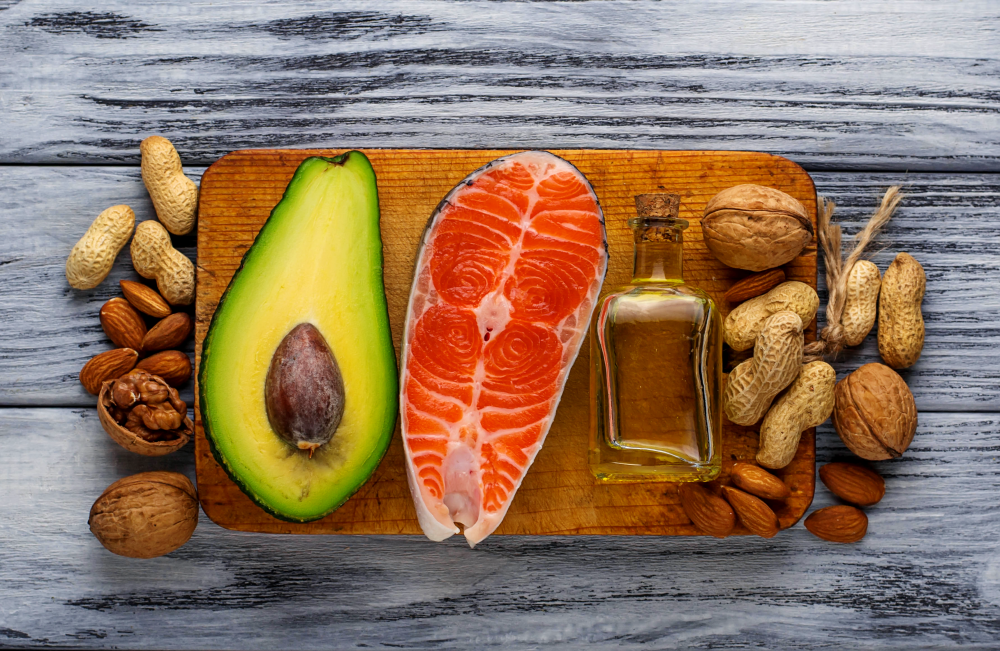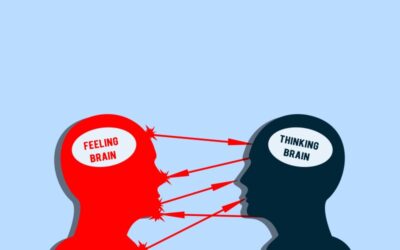Fat is one of three macronutrients found in food that is essential for cell survival in humans. However, it is often demonized as being “unhealthy”. But that couldn’t be further from the truth. Some fats have been linked to improved cognition and decreasing the risk of neurodegenerative disease. With that said, not all fat is created equal. There are two main fat groups.
Saturated fats are found in meat and dairy and unsaturated fats found in vegetable oils, nuts, and fish. Some saturated fats can be harmful if consumed in large amounts. On the other hand, unsaturated fats have significantly greater health benefits.
In this article, you will learn the difference between saturated and unsaturated fats, and how to select the best foods to get the maximum health benefits.
Health Benefits of Dietary Fats
Fat, also called triglycerides, have a number of health benefits.
- Energy: Fats are used for energy once glucose in the blood is depleted. Excess fat gets stored in the fat cells and in the liver. Fat provides 9 calories/ gram and therefore is a more concentrated source of energy compared to carbohydrates and protein (which provide 4 calories/gram). They are an important source of fuel for the body, especially during prolonged exercise or when carbohydrate stores are low.
- Nutrient absorption: Fats are necessary for the absorption of fat-soluble vitamins (A, D, E, and K) and other important nutrients such as carotenoids.
- Hormone production: Fats are essential for the production of hormones, including sex hormones and adrenal hormones.
- Cell membrane structure: Fats are a major component of cell membranes, helping to maintain their structure and function.
- Brain function: Fats are important for brain function, as the brain is composed of about 60% fat. Adequate intake of omega-3 fatty acids, in particular, has been linked to improved cognitive function and a reduced risk of dementia.
- Skin health: Fats are important for maintaining healthy skin, as they help to keep it moisturized and supple.
But as stated earlier, not all fats are created equal, and some types of fats can have negative health effects.
Harms associated with trans fatty acids (trans fat)
Trans fats, also known as partially hydrogenated vegetable oil is far more harmful than saturated fats. The most common type of trans fat is man-made. It’s created through a manufacturing process called hydrogenation and is used to extend the shelf life of food products.
Trans fats are known to:
- Increase LDL cholesterol (bad cholesterol) and decrease HDL cholesterol (good cholesterol) in the blood
- Impair insulin sensitivity: Trans fats may impair insulin sensitivity, which can increase the risk of type 2 diabetes.
- Harmful effects on the brain: Trans fats have been linked to cognitive decline and an increased risk of Alzheimer’s disease.
- No nutritional value: Trans fats provide no nutritional value and are not essential for health.
- Increase inflammation: Trans fats can increase inflammation in the body, which is linked to a variety of health problems, including heart disease, diabetes, and cancer.
The good news is that these fats are so bad they have been ban in most countries. However, there is a little loop hole in the “rules” and if there is less than 0.5 grams/serving, food manufacturers can put “0 grams” on the label.
That said, it is important to recognize the types of foods that may contain these harmful fats and make the effort to avoid them.
Foods that contain potentially harmful amounts of trans fats
- Fast foods—including tater tots, and French fries
- Most spreads—such as margarine spreads or peanut butter
- Snack foods—such as chips, crackers, and cookies
- Fried foods—including fried chicken, onion rings, and nuggets
- Nondairy creamer
- Pre-prepared cake frostings
- Vegetable shortening
- Commercially pre-prepared products, such as pie crusts, pizza dough, and cookie dough
- Pastries, donuts, and pies
“Healthy Fats”
Healthy fats are types of fats that provide important health benefits.
Here are some examples of healthy fats:
Monounsaturated fats
These fats are found in foods such as olive oil, avocados, nuts (such as almonds, cashews, and peanuts), and seeds (such as pumpkin and sesame seeds). They can help to lower LDL (bad) cholesterol levels and reduce the risk of heart disease.
Polyunsaturated fats
These fats are found in foods such as fatty fish (such as salmon, mackerel, and sardines), flaxseeds, chia seeds, and walnuts. They are important for brain function and can help to reduce inflammation in the body.
Omega-3 fatty acids
These are a type of polyunsaturated fat that are particularly important for heart health and brain function. They are found in fatty fish, flaxseeds, chia seeds, and walnuts.
Saturated fats
While saturated fats have been traditionally considered unhealthy, recent research suggests that some types of saturated fats (such as those found in coconut oil and grass-fed butter) may have health benefits when consumed in moderation.
It’s important to note that all fats are high in calories, so it’s important to consume them in moderation as part of a balanced diet. Aim to replace unhealthy fats (such as trans fats and saturated fats from processed foods) with healthy fats from whole foods.
Other articles you may be interested in:
Looking at the Bright Side: How Optimism Can Help You Live a Longer, Healthier Life
Are you a glass-half-full kind of person? If you are, then you’ll love what this article has to say about its impacts on health. If you struggle to look at the brighter side of things, this could be a sign that it’s time for a change. According to a clinical...
Adults throw tantrums too
Have you ever wanted something so bad that it created physical discomfort? I envision kids throwing a tantrum because they can't have something they really want. Far be it for me to argue that they are not experiencing physical pain. Fast forward a couple of decades...
What You Should Know About Sensorineural Hearing Loss
Hearing loss affects millions of people around the globe. According to the World Health Organization (WHO), it is experienced by almost 20% of the entire population! There are three types of hearing loss, but more than 90% are attributed to sensorineural hearing loss....
A Beginner’s Guide to Tai Chi: Benefits & More
Tai chi, also known as shadow-boxing, is a mind-body exercise developed by the Chinese as a “soft” martial art in the 17th century. This low-impact workout involves slow, intentional movements and deep breaths to achieve a meditative state of mind. It makes you...
Stronger Mind, Stronger Body
“Your mind is weaker than your emotions. But you become aware of this weakness only in moments of adversity–precisely the time when you need strength. What best equips you to cope with the heat of battle is neither more knowledge nor more intellect. What makes your...
Understanding Food Cravings, Their Triggers, and How To Manage Them
We’ve all been beset by food cravings at some point in our lives, but most of us don’t really know where they come from or how to resist them. Since cravings are associated with higher body mass indexes, it has become more important than ever to understand the science...
Vision….
Vision is perhaps our greatest strength.. it has kept us alive to the power and continuity of thought through the centuries, it makes us peer into the future and lends shape to the unknown. Li Ka-shing “I can’t”. “It’s impossible”. “I am disabled”. “I have brain...
Mindful Eating: The Moment-to-Moment Experience That Improves Your Quality of Life
Do you watch television or talk to a loved one over text while you eat? Time and again, cognitive science has proved that the human mind is incapable of performing two or more tasks at once. But, living in today’s modern, fast-paced world, we barely notice when we’re...
Want Healthy, Glowing Skin? Try Dry Brushing
Though dry brushing is a comparatively new trend in the skincare world, it has amassed an impressive 130.5 million views on TikTok under a hashtag by the same name. Gwyneth Paltrow and Miranda Kerr are fans of the beauty ritual which speaks of its popularity. As for...
Why You Should Laugh Your Way to Health
The quote, “Laughter is the best medicine,” has more truth to it than you realize. Humor skills or habits—having a propensity to laugh, the enjoyment of humor, the ability to laugh at oneself—are some of the main signature strengths one can possess. In fact, the...











